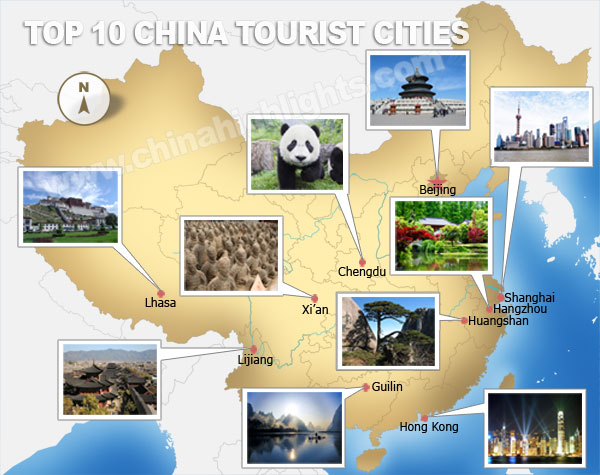Chinese cities have developed names over centuries that often reflect their rich historical, cultural and geographical significance. Let’s take a deeper look at the meanings and origins behind some of China’s most famous city names.
Beijing: Northern Capital
In Mandarin Chinese, Beijing literally means “Northern Capital”. It served as capital during the Yuan Dynasty from 1271 to 1368 AD when it was known as Khanbaliq. When the Ming Dynasty took control in 1368, they changed the city’s name to Beijing, emphasizing its role as the political center of China’s northern regions. For over 600 years since, it has remained the national capital, home to crucial governing bodies and a vibrant cultural heritage.

Shanghai: Above the Sea
Shanghai’s name in Chinese is “Shànghǎi”, meaning “Above the Sea” - an apt description of its location at the mouth of the Yangtze River where it enters the East China Sea. Through most of its history, Shanghai was a small fishing village. But in the mid-19th century, its strategic port access made it a hotspot for foreign trade and maritime commerce. Rapid industrialization and an influx of international businesses transformed Shanghai into one of China’s most cosmopolitan and economically powerful cities.
Guangzhou: Tremendous Prefecture
Written as “Guǎngzhōu” in Mandarin, the city’s name translates to “Tremendous Prefecture”. Guangzhou has served as a major commercial center for over a millennium. Though its name has evolved somewhat, it emphasizes Guangzhou’s enduring role as an administrative hub governing a vast territory. Today, it remains one of China’s most important manufacturing and trade hubs due to its deepwater port and close proximity to Hong Kong.
Hong Kong: Fragrant Harbor
While Hong Kong is now a special administrative region of China, its unique Cantonese name “Hēunggōng” means “Fragrant Harbor”. This poetic name is thought to originate from Hong Kong’s early days as a trading post for aromatic goods like incense. Under British rule from 1841 to 1997, Hong Kong blossomed into one of the world’s most important financial centers. It retains a distinct identity with its blend of Chinese and Western influences.
Historical & Cultural Significance
The names above convey important historical and cultural context about each city. Beijing’s name underscores its primacy as China’s imperial capital. Shanghai highlights its rise as a global commercial gateway. Guangzhou’s name pays homage to its long administrative preeminence. And Hong Kong’s name honors its aromatic past as a bustling port. Naming conventions often imbued Chinese cities with deeper symbolic meanings reflecting their integral functions within society.
River, Mountain and Natural Features
It’s common for Chinese cities to be named after prominent natural landmarks. Suzhou derives from “Sū Mountain” which lies west of the city. Hankou means “Han River Exit”, denoting its place at the confluence of the Yangtze and Han. Shenzhen’s name signifies “Deep Ditch”. Luoyang means “South of Luo River”. Jinan’s name refers to its position “South of Ji River”. Placing importance on the surrounding environment through names highlights humans’ interdependent relationship with nature.
Ancient Kingdoms and Dynasties
Many cities were originally named after the ruling kingdom or state that administered the area centuries ago. Xuzhou was once known as the “Xu State”, one of China’s earliest nine legendary provinces. Similarly, Yangzhou finds its roots in the historical “Yang State”. Jinzhong’s name means “Jin Center”, representing the historical Jin Kingdom’s heartland. These enduring names memorialize each city’s origins within China’s long imperial past.
People, Events and Their Legacies
Chinese cities have also derived names from notable figures or landmark happenings. Hangzhou was once called “Yu Hang” meaning “Left Boat”, possibly referring to a visit by Emperor Yu the Great. Chongqing’s current name commemorates Prince Kong who received the area as his feudal domain. Qinhuangdao pays tribute to China’s first emperor Qin Shi Huang by honoring him as “Qin Emperor”. Place names immortalize the legacies of important people and milestones in each community’s shared memory.
Auspicious Connotations
Certain Chinese city names aim to invoke auspicious and propitious associations. Fuzhou’s name implies the city is “Blessed”. Nanchang means “Southern Prosperity”. Xi’an, formerly known as Chang’an, suggests “Western Stability”. Taizhou symbolizes a “Peaceful City”. Nanning represents “Southern Peace”. These uplifting names reflect cultural priorities around cultivating good fortune and positive social development.
Hope you enjoyed learning about some of the fascinating histories and deeper meanings behind renowned Chinese city names. Their origins tell compelling stories reflecting each location’s unique geographical, cultural and political significance throughout Chinese civilization. Understanding place name etymologies offers insights into societal values, norms and the heritage that helped shape these iconic communities.

 Madrid vs Barcelona: Which Spanish City to Visit?
Madrid vs Barcelona: Which Spanish City to Visit?